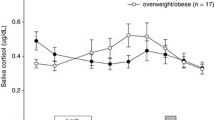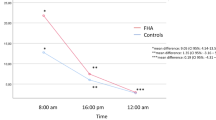Abstract
An abnormal regulation of the hypothalamic-pituitary-adrenal (HPA) axis is associated with risk factors for cardiovascular disease and Type 2 diabetes mellitus. The objective of this study was to examine if morning saliva cortisols show similar associations. Twenty-eight men, all 53 yr of age, delivered during an ordinary working day saliva cortisol samples immediately upon awakening and 15 min thereafter as well as at different times during the day, including after a standardized lunch. Dexamethasone (0.5 mg) suppression of cortisol was also measured. The rise of morning cortisol values was positively associated with body mass index (r: 0.45, p=0.016), waist/hip ratio (r: 0.54, p=0.003), abdominal sagittal diameter (r: 0.54, p=0.003), glucose (r: 0.54, p=0.003), insulin (r: 0.57, p=0.002) and triglycerides (r: 0.46, p=0.014). The morning rise also correlated positively with the elevation of cortisol following lunch (r: 0.45, p=0.043) but not with other cortisol measurements or dexamethasone suppression. Elevation of cortisol immediately after awakening has previously been found to provide a simple indicator of HPA axis regulation, as suggested also by the results of this study, and an elevated rise has been reported after exposure to frequent or chronic perceived stress. The rise of cortisol immediately after awakening might be an indicator of an increased risk of developing serious, prevalent diseases via the metabolic syndrome.
Similar content being viewed by others
References
Kirschbaum C., Hellhammer D.H. Salivary cortisol in psychoneuroendocrine research: recent developments and applications. Psychoneuroendocrinology 1994, 19: 313–333.
Rosmond R., Dallman M.F., Björntorp P. Stress-related cortisol secretion in men: relationships with abdominal obesity and endocrine metabolic and hemodynamic abnormalities. J. Clin. Endocrinol Metab. 1998, 83: 1853–1859.
Rosmond R., Holm G., Björntorp P. Food-induced cortisol secretion in relation to anthropometric, metabolic and hemodynamic variables in men. Int. J. Obes. Relat. Metab. Disord. 2000, 24: 416–421.
Björntorp P., Rosmond R. Obesity and cortisol. Nutrition 2000, 16: 924–936.
Dallman M.F., Akana S.F., Scribner K.A. Stress, feedback, and facilitation in the hypothalamo-pituitary adrenal axis. J. Neuroendocrol. 1992, 4: 517–521.
Pruessner J.C., Hellhammer D.H., Kirschbaum C. Burnout, perceived stress, and cortisol responses to awakening. Psychosom. Med. 1999, 61: 197–204.
Schultz P., Kirschbaum C., Pruessner J., Hellhammer D.H. Increased free cortisol secretion after awakening in chronically stressed individuals due to work overload. Stress Med. 1998, 14: 91–97.
Edwards S., Evans P., Hucklebridge F., Clow A. Association between time of awakening and diurnal secretory activity. Psychoneuroendocrinology 2001, 26: 613–622.
Schmidt-Reinwald A., Pruessner J.C., Hellhammer D.H., et al. The cortisol response to awakening in relation to different challenge tests and a 12-hour cortisol rhythm. Life Sci. 1999, 64: 1653–1660.
Rosmond R., Björntorp P. Occupational status, cortisol secretory pattern and visceral obesity in middle-aged men. Obes. Res. 2000, 8: 445–450.
Hucklebridge F.H., Clow A., Abeyguneratne T., Huezo-Diaz P., Evans F. The awakening cortisol and blood glucose levels. Life Sci. 1999, 64: 931–937.
Björntorp P. Visceral obesity: a civilization syndrome. Obes. Res. 1993, 1: 206–222.
Rosmond R. Björntorp P. New targets for the clinical assessment of salivary cortisol secretion J. Endocrinol. Invest. 2001, 24: 639–641.
Author information
Authors and Affiliations
Corresponding author
Rights and permissions
About this article
Cite this article
Wallerius, S., Rosmond, R., Ljung, T. et al. Rise in morning saliva cortisol is associated with abdominal obesity in men: A preliminary report. J Endocrinol Invest 26, 616–619 (2003). https://doi.org/10.1007/BF03347017
Accepted:
Published:
Issue Date:
DOI: https://doi.org/10.1007/BF03347017




